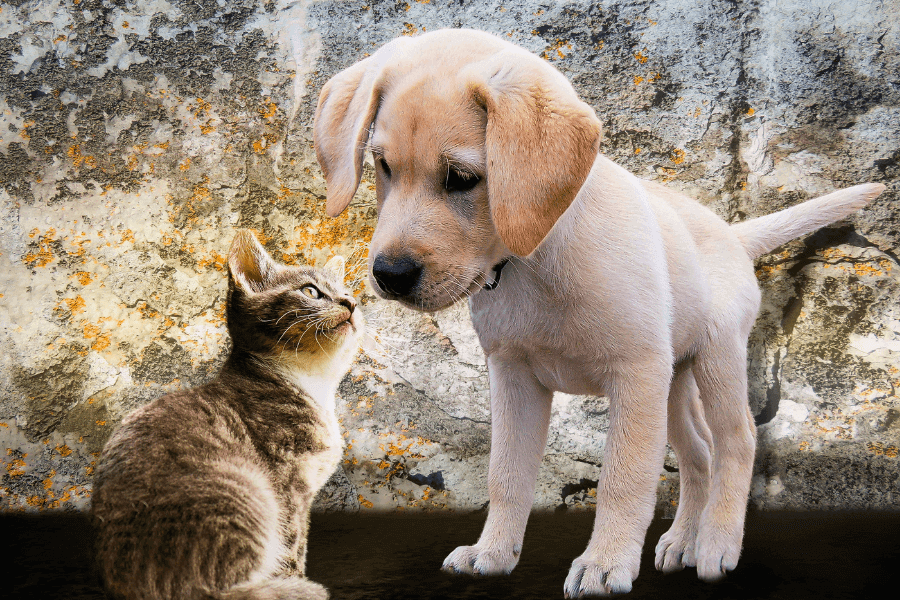The other day I was over at a friend’s house and noticed her dog barking at something outside the window. She commented that her dog hates cats and will bark at the neighborhood cats all night long. Milo often does the same thing. He has never liked cats and tries to escape as soon as he sees one. Why is that so? Why do dogs hate cats?
Dogs do not actually hate cats. Often what people are seeing when they notice dogs chasing after cats is what is called “prey drive.” When cats run at the sight of dogs, the running action triggers their hunting instinct and they automatically start running after them. You might have noticed your dog occasionally chasing squirrels as well.

Disclosure: This post may contain affiliate links. If you purchase a product through one of our affiliate links we make a small commission from the sale at no extra cost to our readers.
After seeing so many adorable photos of cats and dogs living and playing together I know that for a fact that dogs don’t hate cats. The myth that dogs hate cats and vice versa has become such a cliché that the truth behind it has been side-lined. So, if you are an animal lover and you want to have both a cat and a dog, feel free to do so. But, to ensure peace in your household you should probably train your pets not to attack one another.
Different Temperaments of Dogs and Cats
Cats and dogs don’t hate one another.
Both the animals have a different temperament and different way of playing. Dogs are usually more social and playful whereas cats are more independent.
This difference in behavior also plays a role in why both animals don’t get along well with one another.
It’s also very natural for dogs to chase any prey which is smaller than them. This makes cats very vulnerable.
Unlike us humans, our fur babies don’t have any moral values and simply act out of instinct. This doesn’t make them monsters, it is just simply who they are.
Likewise, cats love to hunt and eat mice, that doesn’t make them abnormal either – just part of their nature.
Also, both animals are trained differently. Dogs have been historically trained to chase and hunt which stimulates their prey drive instincts. Cats often see this as a threat and run away from them – just like if I’m in the woods and see a bear, I would probably run too – even though this might actually instigate the bear to chase me, similar to what happens between cats and dogs.
Dogs love to chase after moving objects which marks the beginning of a vicious chasing cycle.
This might make it seem that both the animals are sworn enemies even though they are just playing a simple game of “catch me if you can!”
Predatory Drive in Dogs
It is important to remember that before dogs were domesticated their ancestors were hardcore hunters at heart.
They were never offered kibble in a shiny named bowl.
They had to use their instincts and hunt down their prey to survive. Hence, all dogs have a level of predatory drive present in them.
Have you ever wondered why your dog gets so excited to chase balls? It is also because of this prey drive. The function of hunt and kill has been a part of their evolutionary past and will always be there.
Movement is the key trigger to this prey drive. Anything moving fast would automatically excite them.
Plus, dogs can spot their prey from a distance. They are very smart creatures and can get fixated on their hunt through their gaze and using their sense of smell and hearing to find their dinner.
So, the question arises, would dogs still hunt and chase cats if they were well-fed?
The answer is yet – it doesn’t matter whether they are well fed or not. Dog’s chase and attack cats instinctively and do not do it to harm them. It is in their nature to hunt their prey. The simple running motion triggers excitement in them and puts them into predatory drive.
By training your dog, you can restrain this drive but that doesn’t guarantee that your pooch will not follow his instincts.
So, if you intend to be a parent to both cats and dogs, you’ll need to put in a little work to ensure your cat doesn’t get hurt.
Dog Breeds
Have you ever heard that certain breeds of dogs are good for hunting? Some are better for herding? Some are better as guard dogs?
I’m sure you have.
This is because certain breeds of dogs were specifically bred to do a certain job.
This may not be as true nowadays, but back in the days of old, people needed dogs to serve a specific purpose – a guard dog, a dog to retrieve the animals they hunt, a dog to take care of the sheep.
This is still true in many parts of the world.
In fact, when I was looking at what breed of dog would be best for my family, I specifically looked for a guard dog – a large, loud dog that was good with kids and is very athletic – that’s how we ended up with Milo, the 110 lb Rhodesian Ridgeback.
So if you’re looking to keep a dog with your feline friend, it might actually be worth doing some research on the types of dogs with the least amount of prey drive.
Ways to Stop your Dog from Attacking Cats
Just like you never want your human child to bite other kids on the playground, you never want to see your dog attacking another little furry animal in your home.
Therefore, it is important to take some preventative steps.
However, it’s also important to remember that unlike humans, dogs are not that understanding.
Their behavior can be changed by teaching and restraining their instinct to hunt. This does not mean that they will stop feeling the desire to run after fluffy the cat.
Also, it is important to remember that chasing cats doesn’t make your pooch a bad dog. And that the success of him not attacking cats depends on the dog’s age, breed and also the pet owner’s training approach and consistency in training their dog.
Tips to prevent your dog from attacking cats:
- Spaying or neutering your dog may help to reduce some of the prey drive and overall aggression
- Socialize your dog to be calm around cats, other dogs, and children. This not only increases their comfort level but also decreases their anxiety around other animals as well.
- It is easier to socialize a puppy than an older dog. Older dogs have already been trained to hunt or behave this way around smaller animals might be more difficult to socialize and eradicate this behavior.
- Establish boundaries within your home to allow plenty of room for each pet. Once they are more comfortable with each other you can slowly start to remove some boundaries and observe their behavior.
- When introducing your dog to a new cat, take him for a run or to the dog park first. This way he will be less energetic and excited around the cat and respond to it in a much calmer fashion.
- Always monitor your dog around a new cat whenever they are in the same area. If you notice signs of tension, speak to your dog in a calm manner and give him praise for calm behavior. If things continue to escalate, separate them.
- Behavioral obedience is vital in dogs. Train your dog to follow your commands – this makes it easier to control their behavior if things get out of hand.
Why don’t dogs kill cats?
Usually, when dogs do not attack it is because they might have had a very vicious fight with a previous cat and has learned through a painful lesson. Another reason could be that they have been brought up with a house cat at home and recognize cats as friends.
When will my dog stop chasing my cat?
Dogs are usually intrigued by cats. The best way to make your dog stop chasing your cat is by giving them time. Try to convey your message to your pooch in a gentle tone whenever he approaches your cat. Praise your dog with treats whenever he follows your commands and stays calm.
Are dogs cats’ worst enemies?
No, cats and dogs are not enemies. Cats see dogs and larger animals as predators – this causes them to run away from the perceived threat. Dogs are only following their natural instincts by chasing the moving object. Oftentimes dogs and cats chase each other to play and then remain calm after.
There is no harm in having a cat and a dog living under the same roof. Sometimes dog and cats might read each other’s behavior incorrectly which can result in Armageddon and instigate fights and Tom and Jerry like adventures in the house. But, if you set proper boundaries, socialize your dog to remain calm around smaller animals like cats, and train your dog to follow your commands, you should be able to make friends out of these two species.
Pin it for later!



